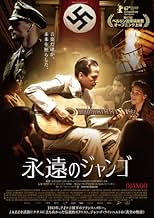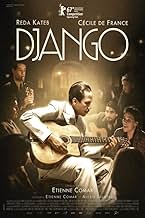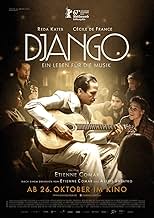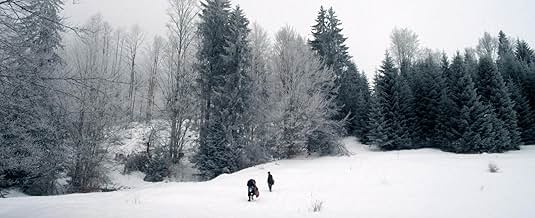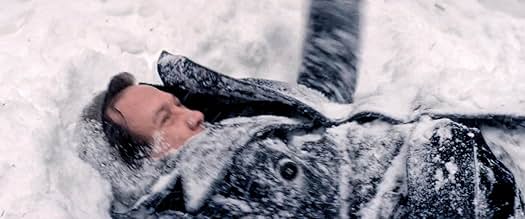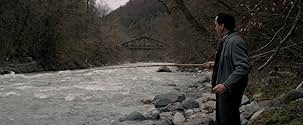Django
- 2017
- Tous publics
- 1h 57m
IMDb RATING
6.4/10
2.1K
YOUR RATING
The story of Django Reinhardt, famous guitarist and composer, and his flight from German-occupied Paris in 1943.The story of Django Reinhardt, famous guitarist and composer, and his flight from German-occupied Paris in 1943.The story of Django Reinhardt, famous guitarist and composer, and his flight from German-occupied Paris in 1943.
- Awards
- 5 nominations total
Cécile de France
- Louise de Klerk
- (as Cécile De France)
Bea Palya
- Naguine Reinhardt
- (as Beata Palya)
Gabriel Mirété
- Lévêque
- (as Gabriel Mireté)
- …
Etienne Timbo Mehrstein
- Timbo Hoffman
- (as Etienne Mehrstein)
Featured reviews
The opening film of the Berlinale competition is yet another take on the sufferings brought on by the second World War. In a mixture of biopic and historical drama, Django fails in standing out from the crowd, walking down the one- dimensional route of escape from Nazi persecution, while rendering its characters secondary.
Django Reinhardt, a guitarist of Romani ethnicity, is dazzling the crowds in Paris during the later days of the German occupation. The specter of deportation looms over his family, his band, yet he refuses to accept the idea that anyone would harm him, due to his positive notoriety. However, after declining to tour in Germany, a quick visit to a local police station makes him see the light, as he flees close to the Swiss border, awaiting transfer. There, he comes across a local Romani camp and they come together to perform music in the area, as a means for survival. That's pretty much the gist of the story, which is as bland as it sounds. After a great opening scene, followed by an equally impressive musical performance, the movie drifts into this grey area where not much happens. Reda Kateb's performance is strong enough to retain some interest, yet the production lingers without delving deeply into either Django's person, nor the plight of the Romani people. Whenever music starts playing, the film comes to life, but this is not sufficient to keep a rhythm.
It's a shame, really, because there are glances of why Reinhardt could have been a relevant leading figure. Being unable to read or write, and bearing a childhood injury on his playing hand,his performances come from a deeply rooted passion for music, seemingly instilled by his Romani heritage and culture. This generates the contrast of music from the heart and music from the head, which is not subtle, yet it plays well with how ridiculously rigurous and lifeless Nazi censorship was. The close knit relations with his family, band and the fellow survivors he meets at the Swiss camp are well shaded against Reinhardt's privileged position, and his sense of entitlement. Yet, there is no clear sense of inner conflict, although the movie does imply that his personal quest is to learn some self sacrifice, putting himself second.
This is part of the problem, that Django just can't set itself apart and come across without conviction. Supporting characters have little to no personality, and function as either plot enhancers, or easy to swap band members. Only the relationship between Reinhardt and his mother is distinguishing, even if it feels at times like comic relief. The generic portrayal of the Nazi oppressors doesn't help either, as is the case with some of the elliptical moments in the story. Even the name of the movie should have given pause for thought: how does one make something distinctive with such an overused title?
Django would have been a much better experience, had it stuck to its music, especially as some of the artist's work was lost, which is a cause for grief. As another survival movie from the war, it falls flat, especially compared to some of the previously released hard-hitting productions, be they grim or soulful representations of the horror.
Django Reinhardt, a guitarist of Romani ethnicity, is dazzling the crowds in Paris during the later days of the German occupation. The specter of deportation looms over his family, his band, yet he refuses to accept the idea that anyone would harm him, due to his positive notoriety. However, after declining to tour in Germany, a quick visit to a local police station makes him see the light, as he flees close to the Swiss border, awaiting transfer. There, he comes across a local Romani camp and they come together to perform music in the area, as a means for survival. That's pretty much the gist of the story, which is as bland as it sounds. After a great opening scene, followed by an equally impressive musical performance, the movie drifts into this grey area where not much happens. Reda Kateb's performance is strong enough to retain some interest, yet the production lingers without delving deeply into either Django's person, nor the plight of the Romani people. Whenever music starts playing, the film comes to life, but this is not sufficient to keep a rhythm.
It's a shame, really, because there are glances of why Reinhardt could have been a relevant leading figure. Being unable to read or write, and bearing a childhood injury on his playing hand,his performances come from a deeply rooted passion for music, seemingly instilled by his Romani heritage and culture. This generates the contrast of music from the heart and music from the head, which is not subtle, yet it plays well with how ridiculously rigurous and lifeless Nazi censorship was. The close knit relations with his family, band and the fellow survivors he meets at the Swiss camp are well shaded against Reinhardt's privileged position, and his sense of entitlement. Yet, there is no clear sense of inner conflict, although the movie does imply that his personal quest is to learn some self sacrifice, putting himself second.
This is part of the problem, that Django just can't set itself apart and come across without conviction. Supporting characters have little to no personality, and function as either plot enhancers, or easy to swap band members. Only the relationship between Reinhardt and his mother is distinguishing, even if it feels at times like comic relief. The generic portrayal of the Nazi oppressors doesn't help either, as is the case with some of the elliptical moments in the story. Even the name of the movie should have given pause for thought: how does one make something distinctive with such an overused title?
Django would have been a much better experience, had it stuck to its music, especially as some of the artist's work was lost, which is a cause for grief. As another survival movie from the war, it falls flat, especially compared to some of the previously released hard-hitting productions, be they grim or soulful representations of the horror.
A splendid gripping film, released on the day we Dutch honor all those who have fallen during the 2nd World War. The captivating acting and the way in which the film was shot, immerses you in and meanders you along a distressing part of Django Reinhardt's life. The spellbinding music in the film, paying homage to Django Reinhardt's innovative jazz with an infusing Gypsy flavor, will stay with you for the rest of your life. And if you ever have the good fortune to visit the chapel of Saint-Pierre in Villefrance-sur- Mer (France) and look at the details of the wall paintings by Jean Cocteau, you will realize what a big impact Django has made on lots of people.
I found the DVD of this movie at my public library and watched it at home. A curious DVD presentation in that it has no menu, it just starts and runs for almost 2 hours, mostly French and German with English subtitles.
I am a musician but only became familiar with Django Reinhardt in the Woody Allen movie "Sweet and Low Down" which featured a fictional character, a guitarist, who would almost faint at the thought of even meeting Reinhardt, his idol. So this movie is a good look at who the guitarist really was.
Reda Kateb, a Belgian actor, is very good as Django Reinhardt. Even though he had been playing for quite a while the story here picks up in 1943 France during the German occupation. Django had a double whammy against him, being a Gypsy and being a Jazz musician, two things the Nazis were against and killed many for. But he managed to survive because of his musicianship.
Good movie of an interesting musician in a difficult time. he didn't live much longer, dying at age 43.
I am a musician but only became familiar with Django Reinhardt in the Woody Allen movie "Sweet and Low Down" which featured a fictional character, a guitarist, who would almost faint at the thought of even meeting Reinhardt, his idol. So this movie is a good look at who the guitarist really was.
Reda Kateb, a Belgian actor, is very good as Django Reinhardt. Even though he had been playing for quite a while the story here picks up in 1943 France during the German occupation. Django had a double whammy against him, being a Gypsy and being a Jazz musician, two things the Nazis were against and killed many for. But he managed to survive because of his musicianship.
Good movie of an interesting musician in a difficult time. he didn't live much longer, dying at age 43.
World Premier at Berlin film festival, Feb. 9, 2017. Django Reinhardt was one of the most brilliant pioneers of European jazz and the father of Gypsy Swing. "Django" portrays one chapter in the musician's eventful life and is a gripping tale of survival. Constant danger, flight and the atrocities committed against his family could not make him stop playing.
Rarely is an opening festival film so compelling and overwhelming that you feel as if the festival ended right there the trip to Berlin would have been justified. Reda Kateb as Django Reinhardt the gypsy musician with the German sounding name, made me forget I was watching an actor playing a part but felt like I was watching the jazz legend Django himself back from the great beyond in the flesh, carefully trimmed Gable moustache and all. This film like last year's Jazz Legend Berlin biopic "Miles Ahead" (Miles Davis) assumes that the audience knows the personality in question well enough not to require any back story and plunges right into a certain segment of the life under scrutiny. In actual fact, while Three fingered guitarist Django Reinhardt was highly regarded by black American Jazzmen such as Duke Ellington, Ornette Coleman, et alia, because his name is mainly associated with the french "Le Hot" jazz scene of the thirties and forties, he is not as well known to the general American public as he should be. Django was simply a musical genius whose hot jazz quintet was the hottest band around in France and surrounding countries up to and including the German occupation years of WW II. This film focuses on two things: The incredible music of Django with half a dozen virtuoso foot stomping musical sequences, and (2) the persecution of Gypsies under Nazi racism. The musical sections show in great detail the fantastic guitar fingerings of the inimitable Django as well as his backup musicians, notably the clarinetist who was also jamtastic.
A German officer who is a great fan of Django's lines up a German tour for the Hot Quintet to entertain Nazi bigwigs in Germany. However there are restrictions that must be met supposedly removing all Black Jazz elements such as the Blues and certain percussion instruments deemed as racially impure by the Nazis. Django finally realizing that if he goes on the tour he will probably never return flees with his feisty mother and family south hoping to make it over the border to Switzerland and safety. Apprehended there he is forced to stage a concert for a group of high level Nazis at a luxurious lakeside villa, but the heat of Djangos hot jazz drives the Germans into a Frenzy and results in a riot. Django escapes in the confusion and survives the war. At the very end after France is liberated a Requiem he composed to honor the Exterminated Gypsies is played on a momentous church organ and Django's heroism is recognized. A final message on screen notifies us that all but the opening bars of Django's requiem were lost, but have been reconstructed by serious musicians to prove that Reinhardt was not only a virtuoso performer but a noteworthy composer as well. Magnificent, beyond words. Cécile de France was also captivating as Django's fictionalized Gadjo (Non-Gypsy) girlfriend who marries a Nazi to save her own life but risks it at the end to save Django, and the old woman who plays Django's mother is a scene stealer every time she appears. Director Étienne Comar has done both the film and music worlds a great service with this remarkable picture.
PS: By no means to be confused with Q. Tarantino's comic book entitled "Django Unchained" under penalty of death!
Rarely is an opening festival film so compelling and overwhelming that you feel as if the festival ended right there the trip to Berlin would have been justified. Reda Kateb as Django Reinhardt the gypsy musician with the German sounding name, made me forget I was watching an actor playing a part but felt like I was watching the jazz legend Django himself back from the great beyond in the flesh, carefully trimmed Gable moustache and all. This film like last year's Jazz Legend Berlin biopic "Miles Ahead" (Miles Davis) assumes that the audience knows the personality in question well enough not to require any back story and plunges right into a certain segment of the life under scrutiny. In actual fact, while Three fingered guitarist Django Reinhardt was highly regarded by black American Jazzmen such as Duke Ellington, Ornette Coleman, et alia, because his name is mainly associated with the french "Le Hot" jazz scene of the thirties and forties, he is not as well known to the general American public as he should be. Django was simply a musical genius whose hot jazz quintet was the hottest band around in France and surrounding countries up to and including the German occupation years of WW II. This film focuses on two things: The incredible music of Django with half a dozen virtuoso foot stomping musical sequences, and (2) the persecution of Gypsies under Nazi racism. The musical sections show in great detail the fantastic guitar fingerings of the inimitable Django as well as his backup musicians, notably the clarinetist who was also jamtastic.
A German officer who is a great fan of Django's lines up a German tour for the Hot Quintet to entertain Nazi bigwigs in Germany. However there are restrictions that must be met supposedly removing all Black Jazz elements such as the Blues and certain percussion instruments deemed as racially impure by the Nazis. Django finally realizing that if he goes on the tour he will probably never return flees with his feisty mother and family south hoping to make it over the border to Switzerland and safety. Apprehended there he is forced to stage a concert for a group of high level Nazis at a luxurious lakeside villa, but the heat of Djangos hot jazz drives the Germans into a Frenzy and results in a riot. Django escapes in the confusion and survives the war. At the very end after France is liberated a Requiem he composed to honor the Exterminated Gypsies is played on a momentous church organ and Django's heroism is recognized. A final message on screen notifies us that all but the opening bars of Django's requiem were lost, but have been reconstructed by serious musicians to prove that Reinhardt was not only a virtuoso performer but a noteworthy composer as well. Magnificent, beyond words. Cécile de France was also captivating as Django's fictionalized Gadjo (Non-Gypsy) girlfriend who marries a Nazi to save her own life but risks it at the end to save Django, and the old woman who plays Django's mother is a scene stealer every time she appears. Director Étienne Comar has done both the film and music worlds a great service with this remarkable picture.
PS: By no means to be confused with Q. Tarantino's comic book entitled "Django Unchained" under penalty of death!
It is more than a beautiful film. It represents a testimony, in so many senses, about the architecture of a period, about the identity of a comunity, about selfishness transformed in compassion and love for the others, about roots of Gypsy Swing and about essence of beauty, vocation and survive.
A film about family and, off course, about identity.
One of the impressive ones. A gem, in fact, for the message, first, for the wise manner to explore a very sensitive, today to, subject, not less. And admirable music.
A film about family and, off course, about identity.
One of the impressive ones. A gem, in fact, for the message, first, for the wise manner to explore a very sensitive, today to, subject, not less. And admirable music.
Did you know
- TriviaAll music played by the incredible Dutch Rosenberg Trio
- ConnectionsFeatures Hoch der Lambeth Valk (1941)
- SoundtracksNuages
Music by Django Reinhardt
- How long is Django?Powered by Alexa
Details
- Release date
- Country of origin
- Official sites
- Languages
- Also known as
- Django Melodies
- Filming locations
- Production companies
- See more company credits at IMDbPro
Box office
- Budget
- €8,804,249 (estimated)
- Gross US & Canada
- $56,556
- Opening weekend US & Canada
- $11,722
- Jan 7, 2018
- Gross worldwide
- $3,876,874
- Runtime
- 1h 57m(117 min)
- Color
- Aspect ratio
- 2.35 : 1
Contribute to this page
Suggest an edit or add missing content

![Watch Bande-annonce [OV]](https://m.media-amazon.com/images/M/MV5BMDc0Zjk3YzgtYTBmZC00MDI5LTg1MjItZjBjMGEyMzI3ODc2XkEyXkFqcGdeQXRodW1ibmFpbC1pbml0aWFsaXplcg@@._V1_QL75_UX500_CR0)


